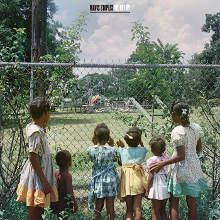The Graham Album Review #1987

Click on CD Cover for Audio Review in streaming mp3 format | |
Mavis Staples: We Get By
by George Graham
(Anti- Records as broadcast on WVIA-FM 6/12/2019)

Click on CD Cover for Audio Review in streaming mp3 format | |
Mavis Staples: We Get By
by George Graham
(Anti- Records as broadcast on WVIA-FM 6/12/2019)
Blues and African-American Gospel music have long had a lot in common, even though the most in the Gospel community shunned the blues as being the opposite of what pious music should be. But that has not stopped a number of performers from inhabiting both worlds, well as the world of soul and R&B. This week we have a new recording by an artist who has been doing that kind of thing since for over 60 years. It’s Mavis Staples, whose new release, her ninth studio album under her own name, is called We Get By.
Mavis Staples was a member of the Staples Singers, a family group led by her late father Roebuck “Pops” Staples. She began singing with them when she was 11 in 1950. The group became widely popular by the 1960s, and with “Pops” Staples close friendship with Dr. Martin Luther King, Jr., the Staples became a kind of de facto musical voice of the civil rights movement. Pops Staples was a prolific composer, but the group also covered 1960s social consciousness songs like Bob Dylan’s A Hard Rain’s Gonna Fall and Stephen Stills’ For What It’s Worth. Their music’s popularity extended well beyond the Gospel world and in 1999, the Staples Singers were inducted into the Rock & Roll Hall of Hame.
Mavis Staples began recording under her own name with an eponymous debut album in 1969. After a 1970 release, she recorded fairly infrequently, then in 1989 and 1993 released albums produced by Prince. In 1996, she recorded a well-received tribute album to Gospel great Mahalia Jackson. She won a Grammy Award in 2010 for best Americana album for her release You Are Not Alone.
She has been recording with increasingly frequency in recent years, often working with musical collaborators. Her last recording 2017’s If All I Was Was Black was a collaboration with Wilco leader Jeff Tweedy. The new release We Get By features Ben Harper, who has won three Grammy Awards of his own. Harper wrote all the songs on the album, either by himself or in collaboration with others, and the musical setting is quite blues-oriented, with guitarist Rick Holmstrom prominent in the small band providing the accompaniment. The songs have a decidedly retro feel to them, both musically and lyrically. Several recall the freedom songs of the 1960s, which have a degree of relevance these days with the rise of overt racism and the attacks on civil rights coming from certain political quarters. But there area also a few more conventional love songs, albeit in blues and soul style.
Leading off is a track called Change whose lyrics sound like a kind of classic song from the civil rights days. The context is a hard-edged blues style with Holmstrom’s gritty guitar. <<>>
More in the style of venerable soul is Anytime, whose lyrics could either be about freedom, or perhaps a love song, or both. <<>>
The title track We Get By is more laid back. It’s a duet vocal with producer Ben Harper. The lyrics are another great example of something that could be a kind of love song, but one that makes observations about the larger world. <<>>
A great song that spans generations putting the civil rights movement into a contemporary social context, is Brothers and Sisters. Ms. Staples and her band serve it up in classic soul style. <<>>
About the closest song to a spiritual in its lyrics is one called Sometime, which combines a Gospel feel with a kind of down-in-the-swamp bluesy sound. It’s one of the album’s highlights. <<>>
The latter half of the album consists mainly of love songs. Never Needed Anyone has the sound and aura of a classic soul ballad. It’s another of one the album’s most memorable tracks. <<>>
Another song which is given a kind of “swamp blues” feel is Stronger, which features Holmstrom’s guitar defining the sound. <<>>
The album ends with One More Change which epitomizes the album’s blend of Gospel, soul and blues.
Mavis Staples released her new ninth album We Get By on the eve of her 80th birthday. She shows no signs of diminishing. Producer Ben Harper wrote the album’s songs specifically for her. Ms. Staples is quoted as saying “My God, he is saying what needs to be said right now.” With songs that touch the larger issues of a deeply divided country, as well as songs on the timeless subject of relationships, the album is another gem in the career of a durable and much acclaimed blues and Gospel singer. The band is basically just a three piece group with an often raw sound that can encapsulate the unvarnished emotions of some of the songs, further putting the focus on Ms. Staples’ vocals that carry the depth of her experience.
Our grade for sound quality is a B-plus. It’s not an audiophile recording, and like the music, there is not much gloss. But the vocals are clean and capture Ms. Staples well. But more dynamic range – how well the recording maintains the ebb and flow of the performance would have given it more impact.
Mavis Staples is a great institution in the world of blues, soul and Gospel music. Her new album is a great reminder of why.
(c) Copyright 2019 George D. Graham. All rights reserved.
This review may not be copied to another Web site without written permission.
 To Index of Album Reviews | To George Graham's Home Page. | What's New on This Site.
To Index of Album Reviews | To George Graham's Home Page. | What's New on This Site.